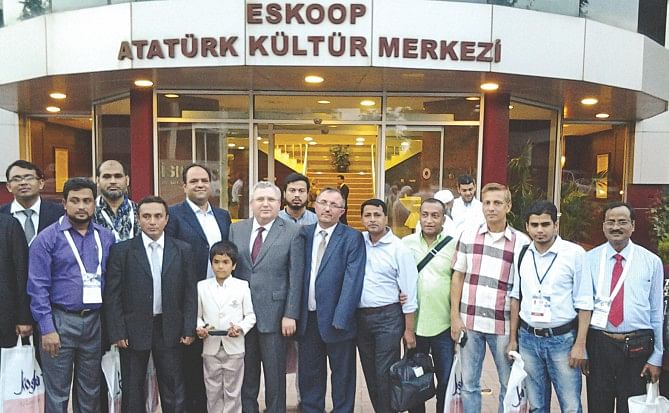Bangladesh-Turkey businesses stress FTA
Bangladesh-Turkey businesses stress FTA

Businesses of Bangladesh and Turkey have urged their governments to expedite efforts for signing a free trade agreement to boost bilateral trade.
The Turkish government imposed 17 percent duty on import of textile and garment items from Bangladesh in June 2012 to protect its domestic apparel industry. All Bangladeshi products, except garment items, enjoy zero-duty benefit in the Turkish market.
“We are working on the FTA. We sat with the officials of the Turkish economic ministry on August 26 and 27 in Turkey to fast track the process,” said Monoj Kumar Roy, additional commerce secretary of Bangladesh.
“The ongoing negotiation for signing the deal should be continued, and it should be signed soon,” Rizanur Meral, chairman of Confederation of Businessmen and Industrialists of Turkey (Tuskon), had told The Daily Star at the Turkey-World Trade Bridge-2014 in June.
Tuskon is a non-governmental and non-profit umbrella organisation, representing seven business federations, 202 business associations and more than 50,000 entrepreneurs of Turkey.
Bangladesh's Prime Minister Sheikh Hasina had announced during her Turkey visit in April 2012 that an FTA will be signed to utilise the business potential of the two countries.
“Bangladesh is a good destination for business. We should collaborate with Bangladesh,” Meral said.
He also said the Turkish businesspeople now want that all Bangladeshi products get duty-free access to their market.
“The FTA is a win-win situation. We have many things to sell to Bangladesh, and on the other hand, Bangladesh has also many things to sell to Turkey.”
Yusuf Akgun, the board chairman of the Turkish Akgun Construction Company, said he is ready to help Bangladesh government develop an industrial zone.
Akgun is now developing an industrial zone in Ethiopia at a cost of around $2 billion with a target to export goods worth $15 billion from the zone.
“My next target is to build up an industrial zone in Kazakhstan.” He also developed the Ikitelli industrial zone in Istanbul in 1984.
Fatih Alparslan, general secretary to the Association of Development Industrialists and Businessmen of Turkey, said Bangladesh has a lot of business opportunities to explore in Turkey.
Alparslan said businesses in the Kayseri province in Turkey import leather and leather products paying high duty. “Bangladesh can easily grab this leather and leather goods market.”
Bangladeshi businesspeople can also invest in industrial areas in Kayseri, which is also famous for furniture products, doors and natural marble stones, he said.
“Bangladesh and Turkey have been maintaining a friendly relation for a long time, but the economic relations have failed to reach the expected level,” said Fikret Cicek, president of Turkey-Bangladesh Chamber of Commerce and Industry.
“We need to sign the FTA for better business between the two countries,” said Cicek, who led a Bangladeshi business delegation to the Turkey-World Trade Bridge.